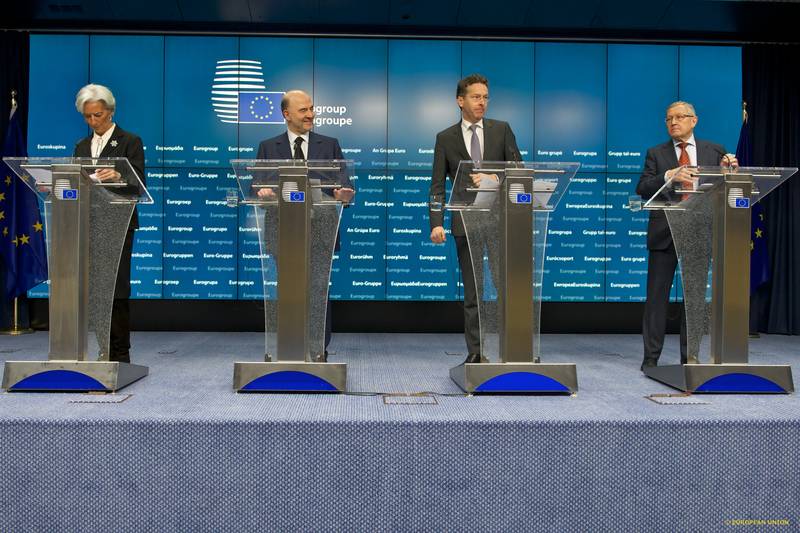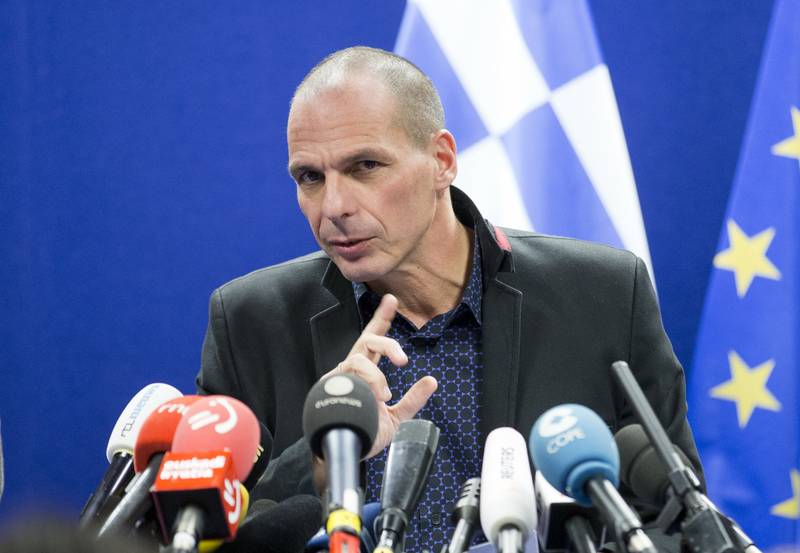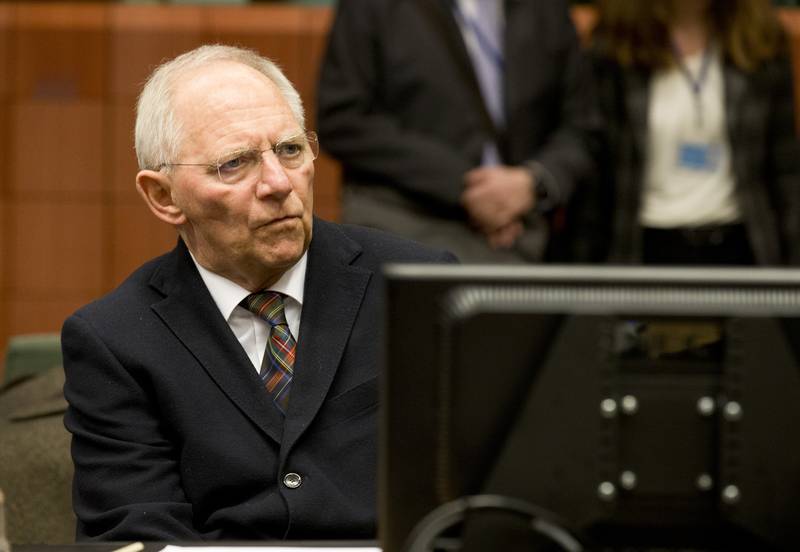Greece and Eurogroup - a Clash of Democracies
Adelina Marini, February 17, 2015
 The patience of the Eurogroup is over and the ministers have put an ultimatum to Greece - an extension of the current programme or you are on your own. This has become clear from the unprecedentedly short meeting of the eurozone finance ministers on 16 February in Brussels. A meeting that was considered crucial for finding of a solution to the conflict between the new far left/far right Greek government and the Eurogroup. The IMF supported their position on Greece. The meeting started at 15.00 CET but instead of the expected long negotiations it ended shortly before 7 in the evening without and agreement and, alas, again with different interpretations of the events. To the Eurogroup everything was a matter of logic and rationality whereas to Greece everything was a matter of phraseology.
The patience of the Eurogroup is over and the ministers have put an ultimatum to Greece - an extension of the current programme or you are on your own. This has become clear from the unprecedentedly short meeting of the eurozone finance ministers on 16 February in Brussels. A meeting that was considered crucial for finding of a solution to the conflict between the new far left/far right Greek government and the Eurogroup. The IMF supported their position on Greece. The meeting started at 15.00 CET but instead of the expected long negotiations it ended shortly before 7 in the evening without and agreement and, alas, again with different interpretations of the events. To the Eurogroup everything was a matter of logic and rationality whereas to Greece everything was a matter of phraseology.
Why is there no agreement?
Contrary to the expectations, the Eurogroup chief, in cold blood, started the press conference with the news that the finance ministers gave their political support to Portugal's request to repay in advance a large part of its loans under the adjustment programme to the IMF. "Like Ireland, which recently started its own early repayments to the IMF, Portugal is demonstrating how quickly a country can be back on its own two feet after a successful adjustment program, provided [there is] ownership and commitment to ongoing reforms". This was definitely an introduction to the Greek issue on which Mr Jeroen Dijsselbloem recalled how the developments unfolded and pointed out that the Eurogroup was disappointed by the outcome of the technical talks in the weekend on the Greek programme. That disappointment stems from the lack of common ground how should the adjustment programme look like from now on and what part of it can be implemented by the Greek government.
After the previous Eurogroup meeting last Wednesday it was clear that Greece was ready to implement 70% of its programme and what these technical talks had to do was to see what can be changed in the remaining 30%. The overall attitude of the other 18 finance ministers in the Eurogroup was Greece to demand another extension of its current programme which would ensure the necessary time for negotiations on a new programme. What the 18 ministers offered Greece in exchange was flexibility for the measures in it. This flexibility, however, can be ensured only if Greece firmly committed not to undertake unilateral actions as in the first days after the parliamentary election when the process of privatisation was stopped and the public servants in the state administration that were laid off with the aim to cut public spending were reappointed. In addition, the Eurogroup insists Greece to stick to all its financial obligations to its creditors and to ensure the stability of the financial sector against the backdrop of the mass withdrawals of savings from Greek banks.
Economic and monetary affairs commissioner Pierre Moscovici said it even more directly: "There is no alternative to a request for an extension to the programme. That is an absolute requirement. That is the framework within which our action takes place. And the Union and its institutions operate on the basis of rules. Rules must be respected", said the French commissioner. In his words, the problems stem entirely from disagreement over phraseology. "We can discuss a lot about the phraseology but this is not the point. The point is to find common ground of thinking. We must be logical not ideological", Mr Moscovici added. Jeroen Dijsselbloem also said that if the problem was how the agreement would be called than it is irrelevant. The Greeks want a bridge agreement but from what they explained in the Eurogroup obviously this is an extension of the programme, he said. How would they call it does not matter, the Dutch finance minister added.
 But to Greece Minister of Finance Yannis Varoufakis phraseology was the main problem. Greece was offered the phrase "some flexibility" in the programme. "We were not interested in some cosmetic changes. The idea of some flexibility was highly problematic", he said in his introductory statement after the end of the meeting. What impressed very much was that, unlike the last time, he spoke at the press conference entirely in English. And another remarkable change. After the previous Eurogroup meeting, Yannis Varoufakis answered only 1-2 questions and then he literally ran away from the journalists and was taken out by the guards through a backdoor. But on Monday he was completely ready to answer any questions.
But to Greece Minister of Finance Yannis Varoufakis phraseology was the main problem. Greece was offered the phrase "some flexibility" in the programme. "We were not interested in some cosmetic changes. The idea of some flexibility was highly problematic", he said in his introductory statement after the end of the meeting. What impressed very much was that, unlike the last time, he spoke at the press conference entirely in English. And another remarkable change. After the previous Eurogroup meeting, Yannis Varoufakis answered only 1-2 questions and then he literally ran away from the journalists and was taken out by the guards through a backdoor. But on Monday he was completely ready to answer any questions.
In his words, the phraseology used by the Eurogroup was problematic because it is too general and does not give a clear idea what exactly is perceived by "some flexibility". This could mean many things, he said and since it was not us that requested it and it was offered to us, it is them who should specify what they mean, he added. Later on, during the briefing, Mr Varoufakis was again an optimist by assuring that the "necessary phrasing" will be found which would allow to move on with the real work on finding the common ground and with the conclusion of a new contract between Greece and Europe. He emphasised on the word "contract" because, according to him, a contract is concluded among equals and Greece no longer wishes to be a debt colony.
The Eurogroup vs the European Commission
A theory of games or a theory of conspiracy? This is the question many were asking yesterday in Brussels after Minister Varoufakis wrote an article in The New York Times in which he said that in his past of an economics professor he dealt very much with games theory. In front of the journalists last night he underscored, however, that Greece was currently in no position to play any games. This did not sound very convincing since he focused his entire introductory statement on a mystic communique, developed by the European Commission, which, he claimed, Eurogroup chief Jeroen Dijsselbloem rejected even before the beginning of the meeting. The attempts to agree on such a communique started last week when everything was agreed but Greece refused to sign it in the very last moment. This happened after many of the ministers had already left the meeting on 11 February completely confident that everything was fine. Among them was also Germany's minister Wolfgang Scheuble.
The situation with the communique repeated itself on Monday evening. Varoufakis's version is that before the Eurogroup meeting Pierre Moscovici offered him a text which he was ready to sign immediately. "I was perfectly happy to sign there and then as it was", Varoufakis said, because the text recognised the humanitarian crisis in Greece and spoke of an extension or the need the Greek government to request an extension of the loan agreement by between four to six months which he called an "intermediary programme", the aim of which is to allow for negotiations on the new "contract" between Greece and the Eurogroup, which Prime Minister Alexis Tsipras called last week "a social contract". This contract should be for growth and development. The communique Mr Moscovici offered the Greek finance minister contained also a commitment by the European Commission to provide technical assistance to the Greek government. The only condition Greece had to sign it was the government not to be demanded to cut the lowest pensions and not to raise the VAT, especially for tourism, Mr Varoufakis explained.
"Unfortunately that splendid document that I was prepared to sign there and then, without a second thought, was withdrawn minutes before the Eurogroup began by the Eurogroup president". In Mr Varoufakis's words, the magic document was replaced by another one which "took us not just back to last Thursday but to last Wednesday when we were pressured not only to seek extension of the loan agreement but of the current programme". The Greek minister underlined that the government respects the current programme and is committed to it because the Greek state, "like every state", has a continuity. "This is an important principle and we fully subscribe to it", Varoufakis said thus refuting his prime minster Tsipras who said at a press conference after his first participation in the EU summit on 12 February that the programme no longer existed.
The problem, according to the Greek finance minister, is that apart from the state commitments democracy should also be respected. The Greek government was elected because of its promise to challenge the programme, he added, again in contradiction with his claim that Greece wants a programme which will not be called precisely a programme. From the strongly contradictory statements of Minister Varoufakis it became clear that he prefers to negotiate with the Commission rather than the Eurogroup. However, this is the only format in which the negotiations take place, which was confirmed by the EU leaders on 12 February and by Pierre Moscovici yesterday: "The framework in which we work is the Eurogroup and this is a collective one". The reason is purely legal because the temporary rescue fund developed specifically for Greece and called European Financial Stability Facility (EFSF) has been founded by the euro area member states in 2010 via an agreement among them.
The permanent fund that inherited the EFSF - the European Stability Mechanism (ESM) - has been created, too, by the member states via an intergovernmental agreement. According to the treaty, the European Commission is tasked only to apply it. In this sense, Varoufakis's statement about a European Commission document and a Eurogroup document is odd.
 Greece again played the democracy card but remained completely isolated by its peers in the euro area who announced that the ball is now in Athens's court. The extended programme expires on 28 February. What remains to be paid under it is 1.8 billion euros from the EFSF, 1.9 billion from the profits from the trade with Greek bonds through the ECB and 10.9 billion euros from the Greek rescue fund HFSF. All this money, however, can be disbursed only if the review of the programme is completed. The last review of the implementation of the programme was made in June last year. If the programme is not extended and it expires on 28 February the money will be lost. Christine Lagarde, the IMF director, also said that the Fund will not pay its own share until the review of the programme is done and it is satisfactory.
Greece again played the democracy card but remained completely isolated by its peers in the euro area who announced that the ball is now in Athens's court. The extended programme expires on 28 February. What remains to be paid under it is 1.8 billion euros from the EFSF, 1.9 billion from the profits from the trade with Greek bonds through the ECB and 10.9 billion euros from the Greek rescue fund HFSF. All this money, however, can be disbursed only if the review of the programme is completed. The last review of the implementation of the programme was made in June last year. If the programme is not extended and it expires on 28 February the money will be lost. Christine Lagarde, the IMF director, also said that the Fund will not pay its own share until the review of the programme is done and it is satisfactory.
It is possible the Eurogroup to meet again in the end of the week (probably Friday) on the Greek issue but everything depends on Athens if it would agree to accept a programme extension. From everything said last night it seems that the Eurogroup and Greece indeed differ only in terms of phraseology which, according to Mr Dijsselbloem, is not a problem. Therefore, it only remains the Greek government to succeed to "sell" the new/old agreement to its voters as something different - be it a temporary, bridge, intermediary or another agreement entirely for the sake of democracy, fully aware that the euro area is a union of 19 democracies. As the minister of finance of Slovakia, Peter Kazimir, described it, "it is not about Greece's wishes but about our own wishes altogether".
 Klaus Regling | © Council of the EU
Klaus Regling | © Council of the EU Mario Centeno | © Council of the EU
Mario Centeno | © Council of the EU Mario Centeno | © Council of the EU
Mario Centeno | © Council of the EU